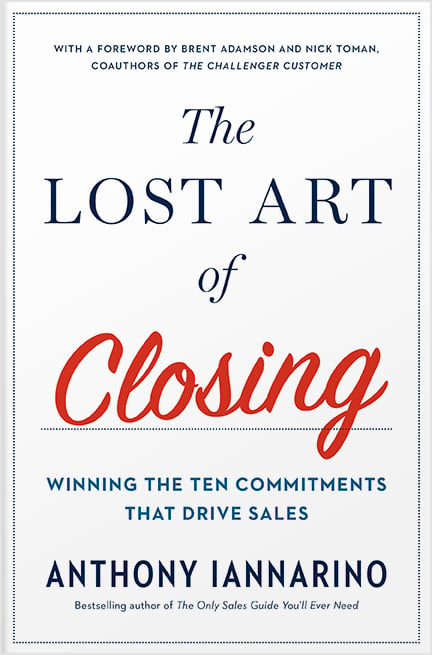The qualifying framework that is BANT (Budget, Authority, Need, and Time-Bound) is no longer quite as useful as it was in the past. Too much has changed in consultative sales, especially the complex sale. A modern sales approach is still going to require some form of qualification, and the process is more a series of gates than it is a series of questions. In many cases, it is a series of conversations and increasing commitments that help you win deals.
Compelled to Change
Review a pipeline from any company, and single out any rep’s pipeline at random. Find a deal that is in a later stage of the process, say, presentation and proposal, looking for one with no recent activity. No matter the number of days the deal has been in the current stage, you know it is a zombie (it looks like it is alive, but it is dead). When this is true, and if it was not lost to a competitor, likely, the prospective client wasn’t compelled to change.
In The Lost Art of Closing, the third of ten commitments is the Commitment to Change. When you don’t confirm that the client is compelled to change and agree that they are, in fact, interested in addressing their challenge, solving their problem, or taking advantage of some opportunity, you often end up with deals that are marked as stalled. The root cause is the client didn’t agree they needed to change.No more pushy sales tactics. The Lost Art of Closing shows you how to proactively lead your customer and close your sales. 
The qualifying nature of the questions as to the commitment to change isn’t a conversation you can have over the phone, or even on a first sales call. You may first have to do some discovery, exploring change, and ensuring that your dream client is compelled to change—or compelling them to change through your insights and a robust theory of the better future they should be seeking.
Check to make sure they are going to do something before you spend all the time and energy necessary to provide a proposal with a low likelihood of capturing an opportunity.
Willing to Build Consensus
Many of the contacts and B2B Buyers you meet with are more than happy to go through the discovery process with you, sharing ideas, imagining a better future, and spending time with you. In days gone by, you might have been directed to ask if the individual you are working with has the authority to decide to buy and sign a contract. Authority no longer works like that.
Because we live in a time when the term “decision-maker” means all of the people who have authority, influence, or both, you are going to need the Commitment to Build Consensus. Instead of the primary question being about authority, you now need to verify that you are going to have access to and help acquiring all the people who are going to weigh in on any decision to change. You need to know what that change is going to look like, and who is going to decide.
If you are single-threaded, and in some cases, working with a team of three people, you may be putting a deal at risk by not going deep enough or wide enough in the organization. Count the number of contacts in each deal you are working. The bigger the deal, the more hands and feet you are going to need to count the number of stakeholders to win deals.
Able to Provide Resources
There are a lot of complex sales that require you to provide resources to your prospective clients, including SMEs and Engineers, and other relatively scarce resources. When this is true, a lot of the time, standing up a solution requires your potential client to apply some of their resources to your initiative. One of the ways you qualify a deal and improve your chance to win at sales is by ensuring they are willing and able to apply resources.
When the solution requires technical experts and resources from your client’s team, access to those resources can not only cause you to struggle through the b2b sales process but can also cause you to fail in the execution when they are missing. Qualifying large, complex, and complicated deals can require you to verify access throughout the process and once you begin implementation.
Agree to Necessary Investment
The investment is always a factor in every deal. The conversation about the investment required to produce the outcome your dream client needs may come earlier in the process, or it may come later, but you will have to verify the money is there at some point.
If what you sell is expensive, or if it is the most costly in your category, you are often better off verifying that your prospect is willing to spend the money. A solution that is too rich is one that is going to be a difficult hurdle to overcome. In some cases, the investment conversation isn’t possible until you do the work of collaborating with your contacts to develop a solution you can provide and a price.
Your Qualifying and Mine
Your qualification might be different than mine. What you might need to verify before and during the process could be different than what I might need to do. For some, qualifying throughout the process is a new idea. Whatever your qualifying process is, it isn’t likely to be done in one conversation, especially on a call to schedule a meeting.

Get the Free eBook!
Learn how to sell without a sales manager. Download my free eBook!
You need to make sales. You need help now. We’ve got you covered. This eBook will help you Seize Your Sales Destiny, with or without a manager.
Download Now







.jpg?width=768&height=994&name=salescall-planner-ebook-v3-1-cover%20(1).jpg)


